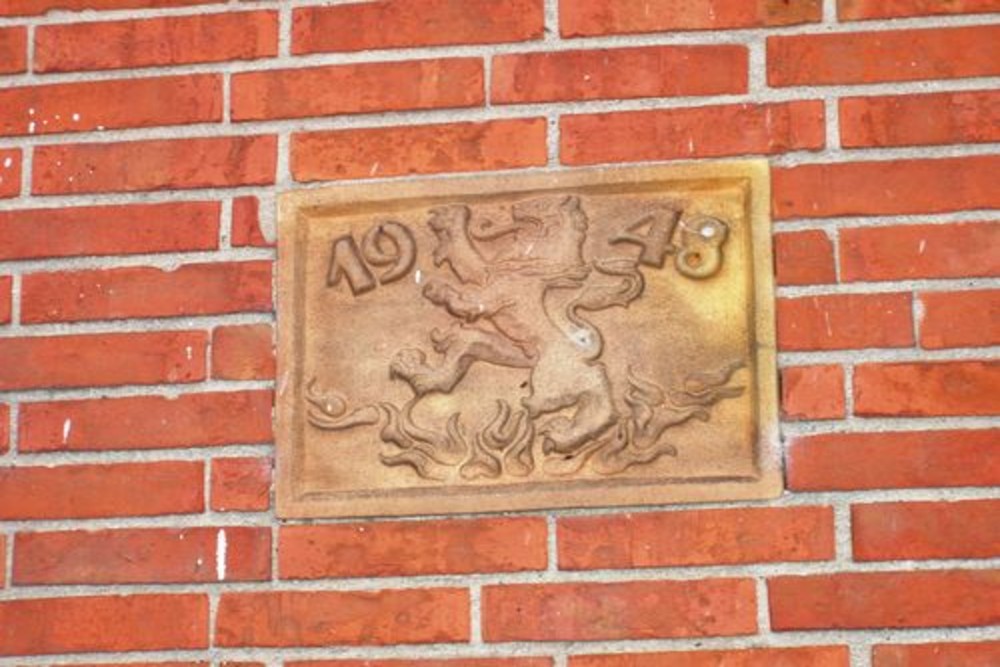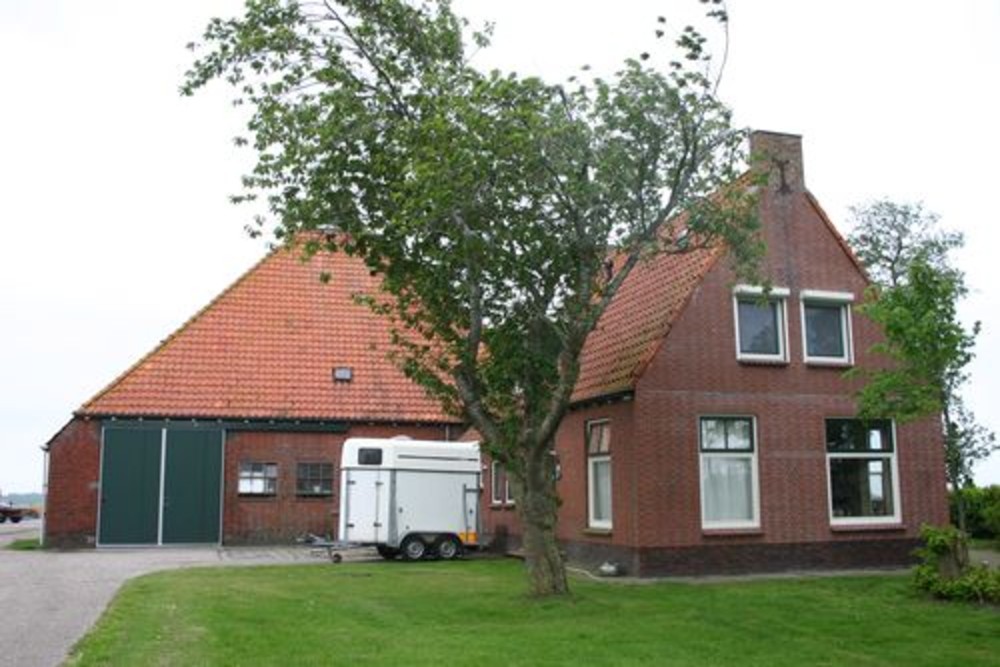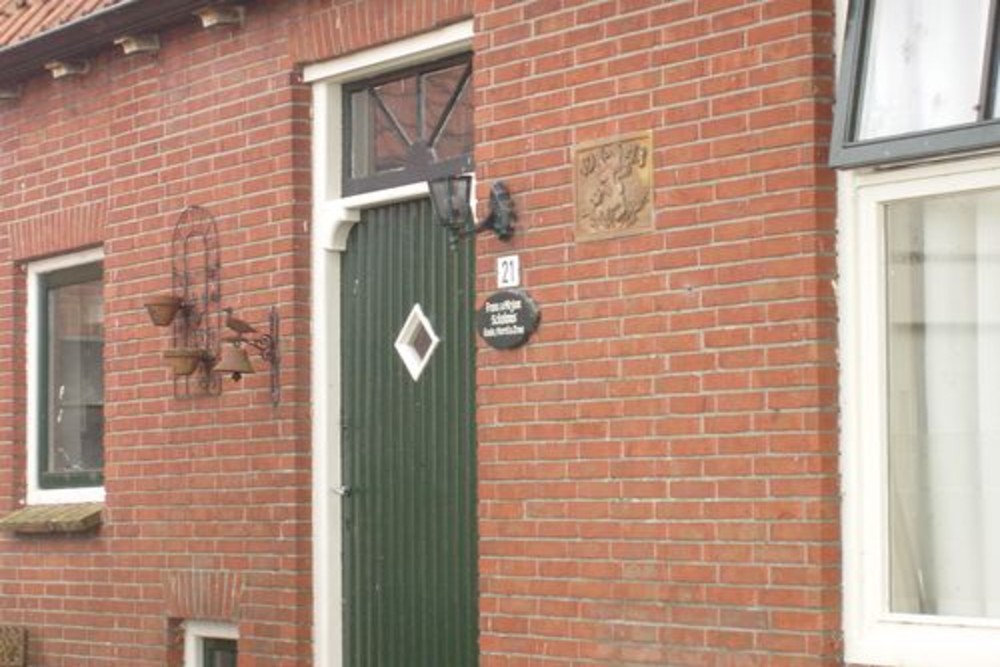Memorial Stone Farm Schotanus
The memorial stone in the farmhouse of Schotanus reminds the inhabitants of Doniaga of the firing on March 17, 1945 of ten prisoners from the Crackstate prison in Heerenveen.
The names of the ten victims are:
On March 15, 1945, two members of the Wasserschutzpolizei from Lemmer were foraging. When they passed the farm of the Schotanus family in Doniaga, at the same time a cow was slaughtered in the barn by some members of the Dutch Interior Forces. A firefight ensued, in which the German Revieroberwachtmeister Platt and the Dutch Unterwachtmeister Kootstra were killed. In retaliation, ten Crackstate political prisoners were shot in the farm yard. Then the building was set on fire. The victims were initially buried in Sint-Nicolaasga. Later they were reburied in their own village.
Jelle Boersma was born on February 17, 1910 in Oosterzee. He was a cattle farmer in Katlijk. His farm was located near the dropping area of allied weapons and ammunition in the Katlijker Schar. Boersma was part of the reception team, which distributed the weapons after the drop. Several containers went to the Knokploeg Echtenerbrug, where arrests followed on 3 January 1945. On 23 January, the Sicherheitsdienst arrested Boersma in Katlijk. The prisoners were taken to Crackstate, where they were subjected to rigorous interrogation. Boersma was buried at the General Cemetery in Nieuwehorne.
Hotze Brouwer was born on May 28, 1910 in Akmarijp. As a cattle farmer at the Beatrixhoeve in Haskerhorne near the Nannewijd, Brouwer had a share in hiding the weapons dropped there in his farm. The slogan used for this dropping field was: 'If the shoe fits, wear it.' He was also an employee of the National Organization for help to people in hiding. Brouwer was arrested on February 8, 1945 and transferred to Crackstate. He was buried at the N.H. cemetery in Haskerhorne.
Wiepke Hof was born on September 8, 1916 in Echten. The 28-year-old shopkeeper in Echtenerbrug was a member of the Knokploeg in his hometown. In the evening of June 13, 1944, the distribution office in Kuinre was emptied.
Roelof Knol, known in the resistance under the pseudonym 'Wim Reinders', had himself locked up in this office in order to let his comrades in at night. The safe was loaded onto a cargo bike. Hof drove the bicycle. Hof also contributed to the distribution of dropped weapons that came from the drop area in Katlijker Schar. On 3 January 1945, the Sicherheitsdienst raided Hof's home, where Luitjen Mulder and Roelof Knol had gone into hiding. The three men were transferred to Heerenveen. Hof was buried at the N.H. cemetery in Echten.
Jeen Hornstra was born on May 22, 1900 in Koudum. This Wijckeler farmer had no relations with the resistance during the war, but was asked by his cousin Laurens Wildschut to hide weapons in his farm. The lot was to be picked up the next day. However, during the transfer, Hornstra was arrested and taken to Crackstate. He was buried at the N.H. cemetery in Wijckel. A street in this village is also named after him.
Albert Koopman was born on February 4, 1917 in Echten. The woodworker was a member of the resistance during the war. He was mainly concerned with distributing dropped weapons and giving weapon instructions to the Knokploeg. On February 19, 1945, the Sicherheitsdienst raided Koopman's home. When they could not find any weapons here, they set fire to the building. Koopman was arrested and taken to Crackstate prison in Heerenveen. He was buried at the NH cemetery in Echten.
Thomas Kuurstra was born on December 28, 1923 in Harlingen. As a student at the Secondary Technical School, he went into hiding with Hotze Brouwer on the Beatrixhoeve. Kuurstra was a member of a combat group and involved in arms transport. He was arrested at the same time as his host. Kuurstra was buried at the General Cemetery in Harlingen.
Siebe de Ruiter was born on January 26, 1882 in Tjalleberd. He was a cattle farmer in Oudehaske. Because his farm was on the water, he received a request from resistance member Hotze Brouwer to hide a batch of weapons that would later be collected by ship. Siebe and his son Dirk, who was born in Oudehaske on September 25, 1921, had been involved in the four weapon drops at Nannewijd. Father and son were arrested and imprisoned in Crackstate. They were buried at the NH cemetery in Oudehaske.
Yde Bouke Yntema was born on February 27, 1902 in Hemelum. After the May days of 1940, he had 'Hald courage' painted on the entrance gate to his farm. During the occupation, the farm of the Yntema family served as a storage place for weapons and ammunition for the resistance. Yntema also cooperated in arms transports. When the news came that a raid by the Sicherheitsdienst was expected, Yntema refused to go into hiding, because his second child could be born at any time. After birth, the boy was not viable. When Yntema was warned for the second time, the farmer did not want to leave his wife alone in these sad circumstances. The next day he was arrested and taken to Heerenveen prison. Yntema was buried at the N.H. cemetery in Hemelum.
Do you have more information about this location? Inform us!
Source
- Text: Bert Deelman
- Photos: Bert Deelman
- Nationaal Comité 4 en 5 mei
Nearby
Monument
- War Memorial Railway Strike - Sint Nicolaasga
- Memorial Lodo van Hamel - Oosterzee
- Memorial "The Child Is Still There" - Echten
Cemetery
- Dutch War Grave Dutch Reformed Cemetery Oosterzee - Oosterzee
- Dutch War Graves N.H. Cemetery - Echten
- Czechoslovak War Grave General Cemetery Lemmer - Lemmer






